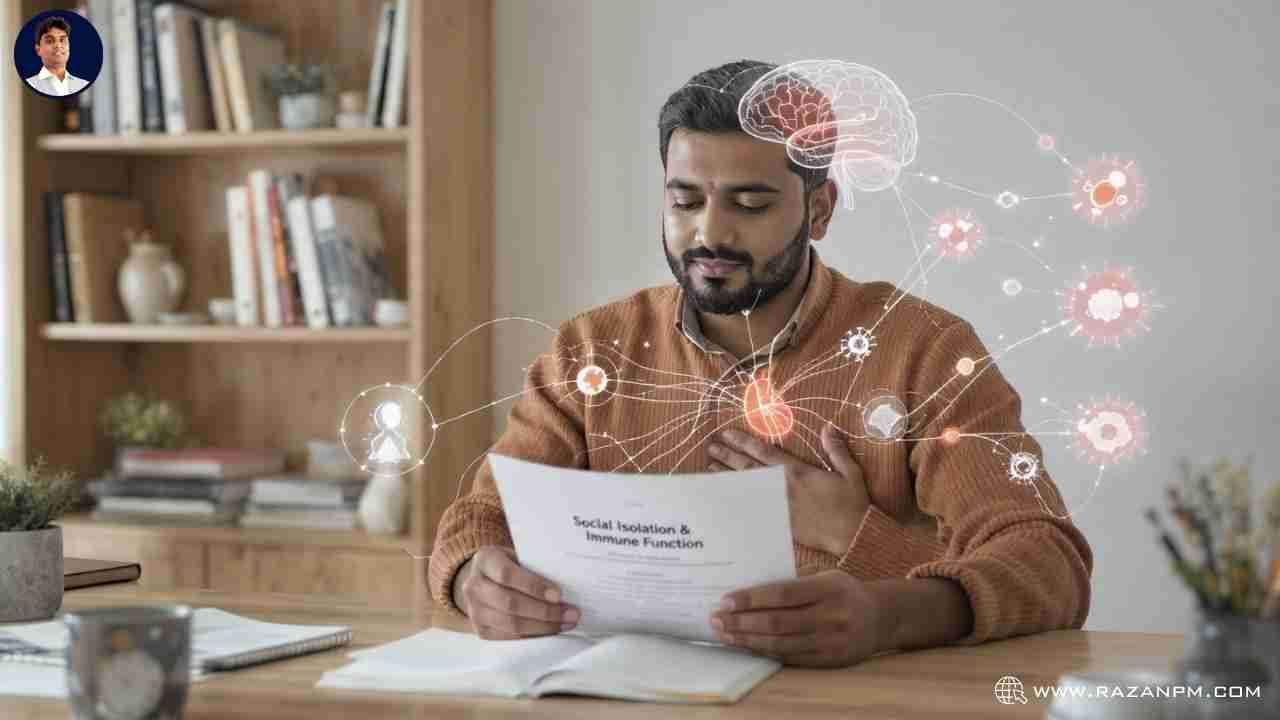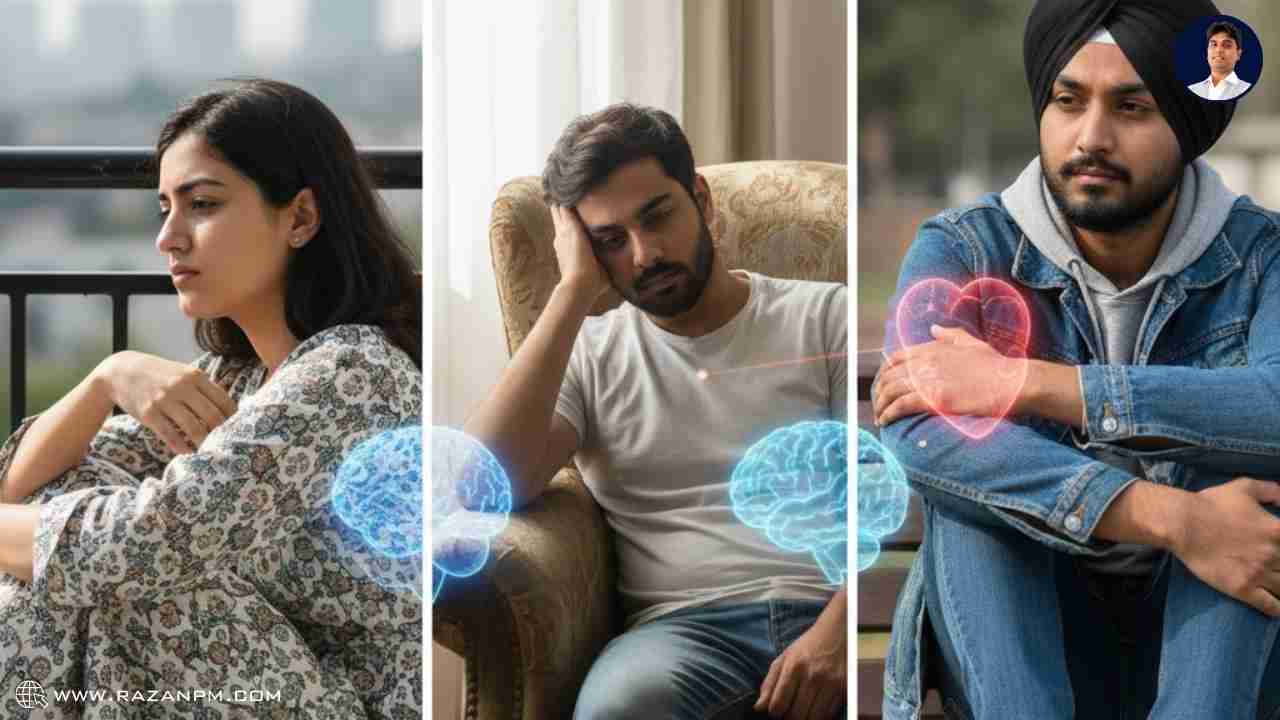You know that funny yet scary feeling?
When you tell yourself, “I just need some me-time,” but soon that me-time turns into overthinking-time — and before you know it, your mood drops, your sleep goes off track, and even your body feels… tired for no reason.
As a Govt.Recognized Counsellor & Mind Healer, I’ve seen this happen countless times — not just in my clients, but also in friends who say, “I’m fine being alone,” when deep down, their silence is screaming for connection.
Let’s talk about something that’s quietly spreading faster than we realize — how isolation triggers both illness and depression together.
also read: what to do when i love you gets noreply
We live in a time where isolation has become an invisible epidemic.
Work from home, social media, emotional burnout — sab kuch mila kar we’ve become more “connected” online and yet completely disconnected inside.
Many people tell me,
“I’m not depressed, I just don’t like talking to people anymore.”
But that’s exactly how emotional isolation begins — quietly, subtly, and almost unnoticeably.
You start skipping calls, avoiding meetups, watching shows till 2 a.m. because silence feels louder than the screen. And slowly, your body and mind start to show signs that something deeper is going wrong.
also read: how fear of rejection kills realconnection

It’s confusing, right?
You’re not exactly sad, but not happy either.
This is what I call the “gray zone of the mind.”
This gray zone often becomes a breeding ground for depression, anxiety, and even physical illness — like headaches, fatigue, weak immunity, or chronic pain.
also read: why timing turns simple talks intobig arguments

1. Sleep disturbances – trouble falling asleep or oversleeping.
2. Appetite changes – eating too much or too little.
3. Constant fatigue – feeling tired despite doing little.
4. Loss of interest – things you loved no longer excite you.
5. Social withdrawal – avoiding people or feeling numb around them.
6. Negative self-talk – “I’m not good enough,” “no one cares,” etc.
7. Body aches or frequent illness – your body starts reflecting your emotional state.
Your mind and body are deeply connected. When one suffers, the other responds.
also read: how everyday pressure breaks yourmind?
According to DSM-5 (Diagnostic and Statistical Manual of Mental Disorders) and ICD-10/11 (International Classification of Diseases), Major Depressive Disorder and Adjustment Disorders are often triggered by social isolation or loss of social support.
When you isolate, your neurotransmitters like serotonin and dopamine (the feel-good chemicals) drop. The brain starts perceiving social disconnection as a threat. This activates your amygdala — the emotional alarm system — leading to stress response, increased cortisol, and inflammation.
In short, your body behaves as if it’s under constant danger — even if no one is around.
This is why isolation can literally make you sick, both mentally and physically.
also read: do voice notes kill realconversations?

A Harvard University study on adult development — one of the longest-running studies on happiness — found that strong social relationships are the most significant predictors of health and longevity.
People who stayed isolated were 2–3 times more likely to develop depression, heart disease, and cognitive decline.
In short — being lonely is as harmful as smoking 15 cigarettes a day.
Scary, right? But also eye-opening.
also read: how bias turns into deep depression?
A few years ago, one of my clients — let’s call her Meera — came to me saying,
“Sir, I don’t understand why I feel sick all the time. My tests are normal, but I feel so tired and sad.”
When we started therapy, it turned out Meera had been living alone in another city for work. No friends nearby, no family visits, just endless hours of silence.
She used to think she was “just tired from work”, but actually, her mind was starving for connection.
We began with simple exercises — a short walk outside, reconnecting with her college friend, joining an online painting group.
Within 3 weeks, her energy started improving. Within 3 months, she laughed again — genuinely.
That’s when I realized:
Isolation doesn’t break you in one big moment; it drains you drop by drop.
But connection — even small ones — can heal you just the same way.
also read: how to tell if emotional separationhas already started?

Here’s something practical you can try right now — I call it the “3-Connection Rule.”
👉 Step 1: Every day, connect with 3 people — they can be friends, family, colleagues, or even your neighbor.
It can be a short text, a smile, or a quick chat.
👉 Step 2: Do one activity outside your comfort zone once a week — join a hobby group, walk in a park, or volunteer.
👉 Step 3: End your day by journaling this line —
“Today, I reached out and felt human again.”
This small act rewires your brain to feel safe in connection again.
It reduces stress hormones and boosts serotonin naturally.
Try this for a week — you’ll feel the emotional fog slowly lifting.
also read: why kind words create misunderstanding?
Of course, isolation can come from deeper emotional wounds — past trauma, rejection, or trust issues. Sometimes, you want to connect, but fear stops you.
That’s where guided emotional healing and therapy come in.
In one-on-one sessions, we work through the why —
Why do you isolate?
What emotions are hiding behind your silence?
And how can we build connection without feeling drained?
This deeper work goes beyond what a blog can explain — it needs a safe, empathetic space to heal your inner world gently.
also read: how caregiving triggers hidden depression?
If any part of this blog feels like your story, please remember:
You don’t have to figure it out alone.
I’ve helped many beautiful souls rebuild their mental and emotional balance after years of isolation. Healing doesn’t mean becoming someone new — it means returning to who you truly are.
If this feels familiar, take the first step.
👉 Book your consultation here. Let’s talk. Let’s heal. Together. 🌻
👉 Begin Your Journey with a 1 on 1 Consultation
👉 Begin Your Journey with a 1 on 1 Consultation

Isolation reduces social connection, which lowers serotonin and dopamine levels in the brain. Over time, this leads to mood changes, anxiety, and even clinical depression. It also increases stress hormones like cortisol that harm both mind and body.
also read: how fibromyalgia fuels hiddendepression?
Yes. Long periods of loneliness trigger inflammation, weaken the immune system, and raise blood pressure. Studies show isolation can be as harmful as smoking 15 cigarettes a day in the long run.
also read: why saying i love you is not enough?
Common early signs include fatigue, low motivation, loss of interest in social contact, poor sleep, and negative self-talk. These symptoms worsen if emotional connection isn’t rebuilt in time.
also read: why emotional intimacy feels unsafefor some partners?
Start small — connect with three people daily, step outdoors for short social exposure, and practice gratitude journaling. Joining a support group or seeking therapy can help you heal faster and deeper.
also read: how hormonal shifts can triggerdepression?
Being alone is a physical state, while loneliness is an emotional experience. You can be surrounded by people and still feel lonely — or be alone and feel peaceful. The difference lies in emotional fulfillment.
also read: how chronic pain fuels depression atany age?
If you’ve been feeling isolated, hopeless, or physically unwell for more than two weeks, it’s time to reach out. A Govt.Recognized Counsellor & Mind Healer can help you identify the root cause and guide you toward emotional recovery.
also read: when silence turns intomisunderstanding?
Absolutely. Therapy provides emotional safety, helps rebuild trust, and re-trains your brain to connect in healthy ways. With guided sessions, you can restore both mental and physical balance.
also read: the emotional burden behind thebody’s battles
Yes — especially for people who find face-to-face sessions hard. Online therapy creates a comfortable space to open up and start the healing journey from the comfort of your home.
also read: 10 coping tools for depression aftertrauma
